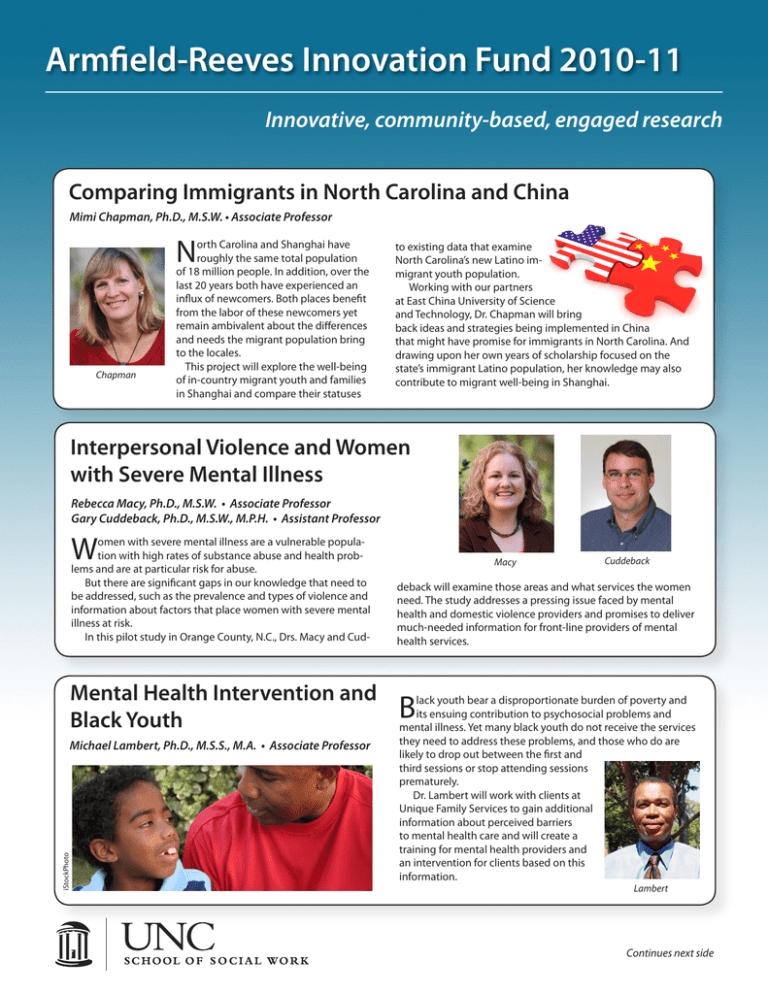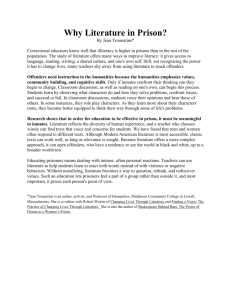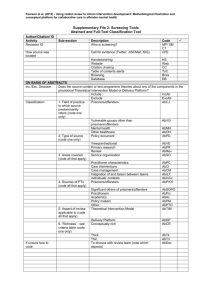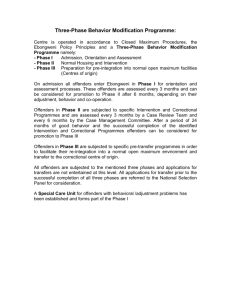
Armfield-Reeves Innovation Fund 2010-11
Innovative, community-based, engaged research
Comparing Immigrants in North Carolina and China
Mimi Chapman, Ph.D., M.S.W. • Associate Professor
N
Chapman
orth Carolina and Shanghai have
roughly the same total population
of 18 million people. In addition, over the
last 20 years both have experienced an
influx of newcomers. Both places benefit
from the labor of these newcomers yet
remain ambivalent about the differences
and needs the migrant population bring
to the locales.
This project will explore the well-being
of in-country migrant youth and families
in Shanghai and compare their statuses
to existing data that examine
North Carolina’s new Latino immigrant youth population.
Working with our partners
at East China University of Science
and Technology, Dr. Chapman will bring
back ideas and strategies being implemented in China
that might have promise for immigrants in North Carolina. And
drawing upon her own years of scholarship focused on the
state’s immigrant Latino population, her knowledge may also
contribute to migrant well-being in Shanghai.
Interpersonal Violence and Women
with Severe Mental Illness
Rebecca Macy, Ph.D., M.S.W. • Associate Professor
Gary Cuddeback, Ph.D., M.S.W., M.P.H. • Assistant Professor
W
omen with severe mental illness are a vulnerable population with high rates of substance abuse and health problems and are at particular risk for abuse.
But there are significant gaps in our knowledge that need to
be addressed, such as the prevalence and types of violence and
information about factors that place women with severe mental
illness at risk.
In this pilot study in Orange County, N.C., Drs. Macy and Cud-
Mental Health Intervention and
Black Youth
iStockPhoto
Michael Lambert, Ph.D., M.S.S., M.A. • Associate Professor
Macy
Cuddeback
deback will examine those areas and what services the women
need. The study addresses a pressing issue faced by mental
health and domestic violence providers and promises to deliver
much-needed information for front-line providers of mental
health services.
B
lack youth bear a disproportionate burden of poverty and
its ensuing contribution to psychosocial problems and
mental illness. Yet many black youth do not receive the services
they need to address these problems, and those who do are
likely to drop out between the first and
third sessions or stop attending sessions
prematurely.
Dr. Lambert will work with clients at
Unique Family Services to gain additional
information about perceived barriers
to mental health care and will create a
training for mental health providers and
an intervention for clients based on this
information.
Lambert
Continues next side
Attachment in Sex Offenders
Melissa Grady, Ph.D., M.S.W. • Clinical Assistant Professor
reating effective treatment programs to prevent sexual reoffending by convicted offenders is an essential step towards
the goal of decreasing the incidence of sexual violence. Yet there
is much to learn about effective treatment approaches.
Despite the growing amount of research that supports that
attachment styles are associated with many of the severe criminogenetic needs found in sex offenders,
no research has been conducted to evaluate whether treatment has any impact on
attachment levels.
Dr. Grady, who is well-known for her
work with sexual offenders, will examine
three areas in this study. The primary
aim is to evaluate attachment styles in
adult incarcerated sex offenders who
receive treatment change compared
Grady
to those who do not receive treatment.
Building Prosocial Support
Carrie Pettus-Davis, M.S.W. • Doctoral Student
T
his study is a randomized controlled
pilot test of an innovative intervention
for former prisoners. The Support Matters
program targets a critical intersection
of public health and public safety by
addressing key post-release risk factors
associated with relapse to criminal behavior
and substance misuse — associating with
substance-involved peers, engaging in
Pettus-Davis
iStockPhoto
C
The second aim is to evaluate how changes in attachment
styles correlate to any changes in the criminogenetic needs. The
third aim is to compare the data obtained using two different
attachment instruments and evaluate their strengths for use with
adult male sex offenders.
The findings from this study may help Dr. Grady obtain
additional funding to conduct a larger trial and develop more
effective treatment to reduce recidivism among sex offenders.
criminal thinking and receiving
limited social support.
Support Matters strengthens
former prisoners’ positive
social support, adaptive
thinking patterns and prosocial
behaviors.
Although positive outcomes
of former prisoners with substance dependencies are linked
to social support, the effect of active involvement of existing
support persons on former prisoners’ substance misuse and
criminal behaviors has not been explored. A pilot test of Support
Matters in Charlotte, N.C. will help fill this gap in knowledge.
Reducing Disruptive Classroom Behavior
Aaron Thompson, M.S.W. • Doctoral Student
iStockPhoto
T
he costs of disruptive behavior and
lost instructional time impact both
students with and without difficult
behaviors, as well as teachers.
Doctoral student Aaron Thompson
Thompson
developed a unique program called
STARS (Self-Determination and
Regulation) when he was working as a school social worker
and principal. STARS is a 4th and 5th grade curriculum
designed to reduce disruptive classroom behavior and
enhance students’ social problem-solving skills.
Support from the Armfield-Reeves fund will allow
Thompson to further refine STARS and provide training
manuals free of charge to schools who wish to use the
program.






